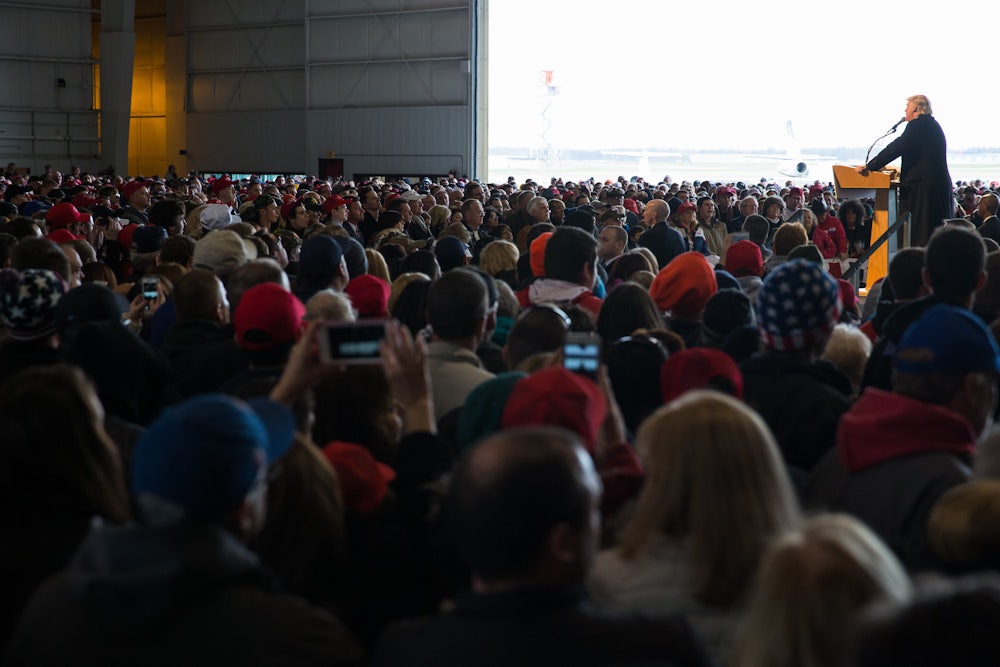At some point in the near future, Donald Trump’s campaign career will come to an end. Should Trump win the Republican Party’s presidential nomination, it is exceedingly likely that he’ll lose the general election in November. Should Republicans manage to deny Trump victory at their nominating convention in July, he could mount a shell of an independent candidacy out of protest, or, perhaps more likely, take to the trail as the P.T. Barnum of an anti-establishment traveling circus.
But by the end of 2016, Trump will have to choose how politically relevant he wants to remain. And his decision will carry tremendous, lasting implications for the GOP.
For many years now, the Republican Party has functioned as a kind of pass-through entity for moneyed actors in the conservative movement, with little regard for the ultimate satisfaction of its own voters. Republicans were in some technical sense united, but widely disliked even by many self-identified conservatives and GOP voters. During the Obama years, GOP leaders reacted to these grievances by performatively mimicking conservative voter anger, and maximizing resistance to President Obama’s agenda.
Trump’s popularity as a candidate reveals the shortcomings of politics rendered entirely in pathos. A large subset of Republican voters didn’t want affect alone. They wanted their grievances addressed with specific deviations from Republican orthodoxy and strategy: more protectionism, more nativism, and the abandonment of innuendo in favor of explicit chauvinism and bigotry.
In the aftermath of Trump’s candidacy, these voters will either scatter back into a diffuse population of marginally attached voters, with little if any remaining love for the Republican Party, or they will become a more permanent fixture of American politics and an enduring source of disorder for GOP leadership.
Which path they take depends to an unusual extent on Trump himself—and on his interest in politics absent the immediate promise of ultimate power.
Trump’s campaign, like his private-sector career, has been an outgrowth of his own ego. In traditional campaigns, candidates delegate tremendous authority to their top staffers, because the task of winning a nomination and then an election is difficult and time-consuming. Trump has little patience for any of that. Media exposure and massive rallies at which he is the main attraction are the lifeblood of his candidacy. To the extent that he delivers speeches, he writes them. If there’s a strategy, it’s to win by starving his opponents of exposure and enticing them into the mud, confident that he is the dominant mud-wrestler.
This isn’t the profile of a typical movement leader. They sometimes achieve measures of fame, but much of the work of movement-building is done in the field, and requires strategic acumen, organizing, fundraising, mobilization, recruitment, endurance, and ideological dedication.
On the strength of his fame and shamelessness, Trump has proven somewhat adept at running a campaign (or, perhaps, a cult of personality). But Trumpism in its current form is not a movement, and it cannot survive without Trump himself. Trump has several high-profile, career-minded endorsers, but he has developed almost no campaign infrastructure that could become a movement foundation, and he’s inspired almost no down-ballot proteges.
If Trump’s career in politics ends with his presidential campaign, it might be many cycles before anyone successfully reprises Trumpism—or, more optimistically, a chastened Republican Party might adopt a new politics that puts a lid on Trumpism forever.
For all these reasons, the idea of Trump leading a political movement that doesn’t aim at his own election seems far-fetched. But at this point, Trump may be more of a political animal than an entrepreneurial one. Trump has all along imagined that if his campaign fails, he can easily transition back into private-sector life, hosting primetime TV shows and continuing to license his name for luxury products. “I’ll go back to my business,” he’s said. But it is quite possible that his conduct over the course of this campaign, which has made him one of the most loathed men in the country, will leave that business model in tatters.
As Trump lives for money, power, and fame, his most dependable source of sustenance might now be in politics. As the guardian of his own ego, he’ll have a large incentive to become a new kind of political force rather than a guy who was once associated with glitz and is now associated with racism.
Trump has, for better or worse, managed to bring festering resentments of the white working class to the surface of our political culture. He has also proven that his supporters can be loyal constituents. It is hard to imagine this cohort going quietly into the night after the GOP convention, or after the election in November. And if they beg Trump to remain their leader—to turn the Trump presidential campaign into the Trump National Revival Movement, to hire the people and build the institutions such an undertaking would require—why would he possibly turn them down?
